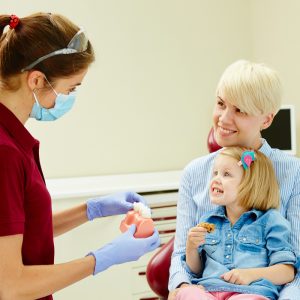Infant Dental Exams
The Six Most Common Orthodontic Problems
May 2, 2019What To Expect When Getting Your Braces Removed
May 17, 2019
Did you know that your baby should have his/her first dental exam by their first birthday? Children, even infants, should begin their dental care as soon as their baby teeth begin erupting. Monitoring baby teeth as they come in is an essential part of keeping teeth healthy and identifying any issues before they become severe. Infant exams are done differently than that of normal exams as you will hold your child while the dentist inspects their mouth. This process allows the child to maintain the comfort of being with their parent while receiving the dental evaluation that they need. Learn what to expect at your infant’s first dental exam and how you can start their oral health on the right foot!
Oral Health and Babies
Children, especially infants and babies, hit milestones in their development every day. These physical developments include dental changes that are occurring in their mouths, such as baby teeth erupting, learning how to chew and learning to speak. The American Academy of Pediatric Dentistry recommends that children receive their first dental exam by their first birthday or within six months after their first baby tooth erupts. Regular dental visits, even for young infants, help protect a child’s newly formed teeth from developing tooth decay and avoid cavities early on. Any teeth, even baby teeth, can get cavities, so it is important to start your child’s oral health out on the right foot by visiting their dentist. Early exams allow their dentist to detect problems early on and provide tips to the parents about how best to care for their sensitive teeth. To have healthy permanent teeth during adulthood, healthy baby teeth prepares the mouth for those future teeth to come.
What To Expect During An Exam
An infant dental exam is a fairly quick and noninvasive process that allows the dentist and hygienist to evaluate your child’s mouth health. Just like any other dental visit, your child’s teeth and jaw will be examined to ensure that teeth are growing in properly and to look for any abnormalities. For young children, their examination will be done in a “knee-to-knee” position in which the child will be positioned towards their parent, with their legs wrapped around the parent’s waist, and then lowered onto the dentist’s lap while the parent holds the child’s hands over their stomach. This allows the child to stay in the comfort of the parent’s lap and still have dental treatment done. The dentist will examine the child’s mouth with a soft toothbrush and a mirror to make the visit as comfortable as possible. Depending on what is needed, the hygienist might scrub any teeth with a wet toothbrush or cloth to remove stains, and look for sores or bumps on the child’s tongue and cheeks. Although some children do get fussy during this process, it is important for each parent to understand the necessity of these infant dental exams to properly examine, diagnose and treat any oral health complications their child might be experiencing.
The infant dental exam won’t just be an examination for the child, but will also include questions for the parent about the child’s oral health. The dentist and hygienist will ask you about your child’s overall health, drinking and eating habits, and assess how much fluoride they are getting in their diet and oral hygiene products. They will also evaluate how pacifier use and thumb sucking is affecting your child’s teeth, and demonstrate proper cleaning techniques. To end, the dentist will clean your child’s teeth and give you instructions on how to care for your child’s oral health until their next checkup a few months later.
Tips For A Successful Visit
Every parent wants their child to have a happy and successful visit with the dentist, but there are a few tips that can help your visit go as smoothly as possible. Especially for young children, don’t schedule their dental visit during naptime. Pick a time in which your child will be the most rested and cooperative so that they can be calm and happy during their visit. Save any snacks that your child will be eating for after the visit so that they don’t have any food particles on their teeth during their exam. Make sure that your child has eaten before the exam so that they’re not hungry, and brush their teeth afterwards so that they can be prepared for their cleaning with the dentist.
If your baby is due for their first dental exam, call Hardy Pediatric Dentistry & Orthodontics at (720) 887-6003 for a consultation! Our experienced team is dedicated to your child’s oral health needs and helping them develop a healthy and happy smile!